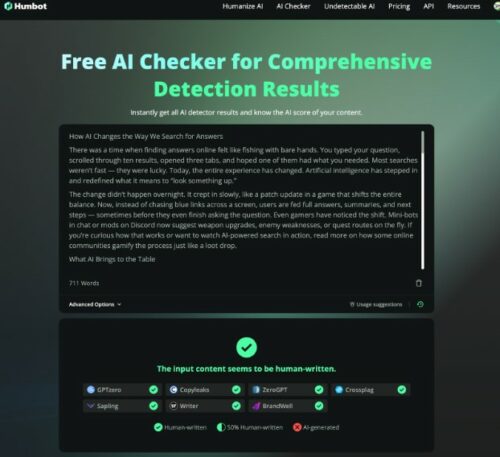How AI Changes the Way We Search for Answers
There was a time when finding answers online felt like fishing with bare hands. You typed your question, scrolled through ten results, opened three tabs, and hoped one of them had what you needed. Most searches weren’t fast — they were lucky. Today, the entire experience has changed. Artificial intelligence has stepped in and redefined what it means to “look something up.”
The change didn’t happen overnight. It crept in slowly, like a patch update in a game that shifts the entire balance. Now, instead of chasing blue links across a screen, users are fed full answers, summaries, and next steps — sometimes before they even finish asking the question. Even gamers have noticed the shift. Mini-bots in chat or mods on Discord now suggest weapon upgrades, enemy weaknesses, or quest routes on the fly. If you’re curious how that works or want to watch AI-powered search in action, read more on how some online communities gamify the process just like a loot drop.
What AI Brings to the Table
Modern AI search tools do more than index websites. They interpret intent, respond in natural language, and even offer follow-up suggestions. This new generation of search changes both how we ask and how we process answers. Instead of pages of results, you now get one crafted reply — almost like chatting with a helpful NPC in a game lobby.
Here are a few ways AI reshapes the search experience:
- Contextual understanding: AI tools remember what you’ve asked and adjust answers based on your previous queries, much like a game that saves your progress and tailors events accordingly.
- Answer synthesis: Instead of pointing you to a site, the AI combines information from multiple sources into a single, coherent reply.
- Speed and precision: Typing a vague question like “best settings for performance” no longer gives a messy mix of blog links. The AI clarifies if you mean your PC, console, or mobile device — then responds accordingly.
- Personalization: Some tools adjust tone and depth based on user history or preferences. It’s the equivalent of switching from beginner to expert mode mid-match.
The Trade-Offs We Don’t Always See
As with any powerful tool, this new model comes with side effects. Users begin to depend on answers that skip over nuance. Instead of learning the mechanics behind a strategy or concept, people just follow the move list. Gamers might recognize the feeling — you win the match, but do you understand the meta?
A few quiet concerns echo in the background:
- Loss of depth: When answers come quickly, there’s less motivation to explore. AI might flatten a rich topic into a few digestible lines.
- Bias and hallucination: Even the smartest models sometimes get it wrong or inject assumptions. Trust, but verify.
- Overreliance: The smoother the response, the easier it is to stop thinking critically. That can make users lazy or vulnerable to misinformation.
Adapting to the Shift
The key is not to fear the change but to learn how to ride it. Search isn’t dead — it’s transformed. The browser bar isn’t just a question box now. It’s a dialogue space, a teaching tool, and sometimes a companion.
To make the most of AI-powered search, users can:
- Frame questions clearly: Just like setting a mission objective in a game, the clearer the task, the better the outcome.
- Dig deeper after the first result: AI answers are fast, but not always complete. Clicking on the sources it references still helps.
- Mix sources: Don’t let one engine or platform guide your entire quest. Use a mix — think of it as exploring different zones in a map.
The next generation may never know the frustration of misspelled keywords or ten blue links of disappointment. But they’ll face their own puzzles: verifying what’s true, learning to spot gaps in summary answers, and deciding when to take the shortcut or play the long game.
In the end, AI hasn’t replaced the search — it’s just changed the terrain. Like switching from a 2D side scroller to an open-world RPG, the core idea remains. You still seek, explore, and unlock new knowledge. The difference now is that the guide speaks your language and responds before you even finish typing the quest.



















Rating
Please rate this post!Không có đánh giá nào.